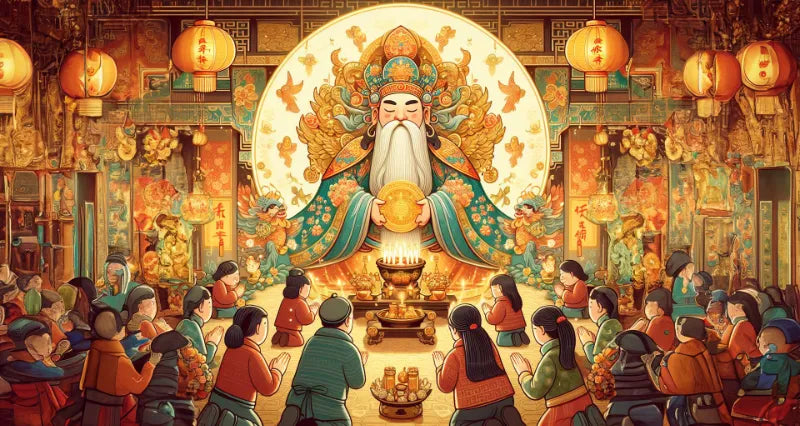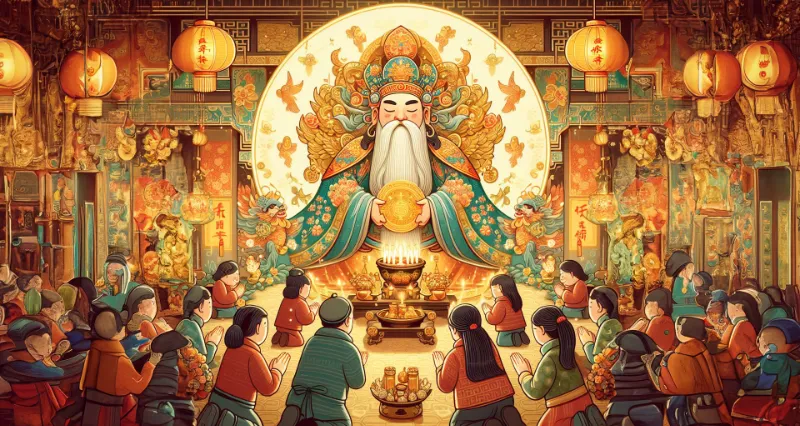
Unveiling the Origin of the God of Wealth: How Does the Mysterious Guardian Deity of Wealth Affect Your Financial Fortune?
Share
The God of Wealth is a well-known deity associated with prosperity, deeply revered and beloved by a multitude of people. Throughout history, numerous stories about the God of Wealth have been passed down as folktales, influencing people’s concepts of wealth pursuit and management. The information herein includes the origin of the God of Wealth, the various types of wealth deities, and the food the God of Wealth likes to eat. As well, you’ll be guided on how to receive blessings from the God of Wealth to enhance your personal financial fortune.

The Origin of the God of Wealth and Stories of Three Wealth Deities
The God of Wealth is the guardian deity of prosperity, symbolizing wealth. Hence, it is the most important deity people pray to when facing economic difficulties. How did the God of Wealth become associated with wealth? There are various interpretations of the origin of the God of Wealth, and there are numerous types of wealth deities. The following introduces the stories of the three most famous wealth deities.
Get to Know the Military Wealth God
The Military God of Wealth refers to Guan Yu, also known as Guan Gong. Guan Yu, with the courtesy name Yunchang, lived during the chaotic period at the end of the Han dynasty. He was not only a courageous general during the Three Kingdoms period but also a person of great loyalty and righteousness, most famous for the feat of “passing five passes and slaying six generals.”
Amidst the chaos of the late Eastern Han dynasty, Guan Yu, Liu Bei, and Zhang Fei formed a sworn brotherhood based on their shared ideal of restoring the Han dynasty and ending the turmoil. Later, Guan was captured by Cao Cao. However, impressed by Guan’s martial skills and character, Cao not only treated him well but also granted him titles and land. Nevertheless, Guan, bound by brotherly loyalty, left Cao’s camp upon learning of Liu’s whereabouts. Despite various obstacles set by Cao, Guan, alone yet fearless, passed through five checkpoints and slew six of Cao’s generals. This journey showcased Guan Yu’s heroic nature, becoming a classic story extolled in later generations.
During the Tang dynasty, statues of Guan Yu were already present in Buddhist temples, and he is referred to as the Bodhisattva of the Monastery, serving as the guardian deity of Buddhist temples. During the Song dynasty, Taoist practitioners also began to worship Guan Yu, who was bestowed various titles, such as Martial Peace King and Chongning True Lord, enhancing his image in Taoism. Later in the Ming dynasty, Emperor Wanli honored him as the Great Deity Suppressing Demons in the Three Realms and the Deity Emperor Guan, while the Qing dynasty emperors titled him the Loyalty and Righteousness Martial Deity Guan Sheng Emperor. Worship of Guan Yu became widespread among the common people, reaching its peak during the Ming and Qing dynasties.
Guan Yu remained a symbol of loyalty, righteousness, and bravery in people’s hearts. Besides being revered as a martial saint on par with the literary saint Confucius, Guan Yu was also considered the guardian deity of wealth by merchants in Jin, his hometown. Jin merchants not only worshiped Guan Yu themselves but also built temples dedicated to him wherever they went, emphasizing their pursuit of wealth through righteous means and ethical business practices. With the development of Jin merchants, the culture of worshiping Guan Yu became increasingly popular, establishing him as a genuine martial God of Wealth.
Guan Yu’s Image and Wealth
The recorded image of Guan Yu in history is distinctive: a red face, a long beard with five strands, wearing a green robe, wielding the Green Dragon Crescent Blade, and riding a Red Hare Horse. How does this appearance relate to wealth?
Grandmaster JinBodhi believes that Guan Yu’s attire is favorable for wealth accumulation, considering the Chinese philosophy of yin and yang, the five elements, and even the five colors and five directions:
- Green Robe: Green symbolizes wood, representing growth, vitality, and the lifeforce. It also signifies the East, where the sun rises every day, symbolizing vital energy. Wealth accumulation naturally involves the energy of growth.
- Weapon: The Green Dragon Crescent Blade represents vitality, underlined by the green color. The dragon symbolizes speed and immense energy, essential in business for achieving success quickly. The blade signifies striking and retaining profits, making the Green Dragon Crescent Blade a symbol of rapidly amassing wealth.
- Red Hare Horse: It balances the yin and yang elements when appearing alongside the Green Dragon Crescent Blade. Additionally, Guan Yu’s red face and green robe also create such balancing effect. Grandmaster JinBodhi suggests that balanced development is the most stable and healthy.
- Five-Strand Long Beard: Guan Yu’s beard represents strength in all five elements – gold, wood, water, fire, and earth. In Chinese physiognomy, having strength in all five elements in a balanced way signifies true wealth and nobility.
Story of the Civil God of Wealth: Gathering Wealth, Giving Up Three Times
Fan Li, originally an ordinary civilian in the Chu state, later ventured into politics and business, becoming a legendary figure in history. His legend lies in three instances during his political and business career where he accumulated vast wealth and three instances where he selflessly dispersed his family’s wealth. Here is a brief introduction to Fan Li’s legendary actions of gathering and giving up wealth.
After seeking refuge in the Yue state and assisting King Goujian in defeating the Wu state with his outstanding wisdom, Fan Li was made a top general, the head of the hundred officials, and enjoyed wealth and glory. However, recognizing Goujian’s nature, Fan Li knew they could share hardships but not wealth. Thus, despite his success and status, he resigned from his high-ranking position, abandoned all his family’s wealth, and left the Yue state.
Subsequently, Fan Li arrived in the Qi state, already in his 60s, and suddenly shifted to the business field. He engaged in various enterprises, including fishing, salt production, agriculture, and multilateral trade. With his profound wisdom and foresight, Fan Li accumulated tremendous wealth. When the King of Qi learned of his intelligence, he sent envoys to invite Fan Li to become the prime minister of Qi. Fan Li, however, lamented that although having substantial family wealth and high-ranking positions seemed like a good thing, he considered it an ominous sign. Consequently, he once again distributed his family’s assets to the surrounding elders, neighbors, and the impoverished masses.
Fan Li then moved with his family to Dingtao, changed his name to Zhu Gong, and began his third entrepreneurial endeavor. Shortly after, with honesty, wisdom, charity, and righteousness, Fan Li became the wealthiest person in the area. One year, Dingtao experienced a severe drought, leading to a failed harvest. Fan Li generously distributed the majority of his vast wealth to aid the country in disaster relief, providing porridge to help the suffering people. He became known as Tao Zhu Gong.
Fan Li’s deeds were praised by Sima Qian, who described him as “loyal in governing the country, brave in defeating enemies, wise in protecting oneself, and skilled in becoming wealthy.” Fan Li’s story inspired many people and his business experiences were recorded and widely spread. Numerous merchants even hung signs reading “Business of Tao Zhu” to highlight the business philosophy of “becoming wealthy while adhering to virtue.” Later on, people directly worshiped the portrait or statue of Tao Zhu Gong in their shops, hoping to inherit his spiritual legacy and receive his blessings.
